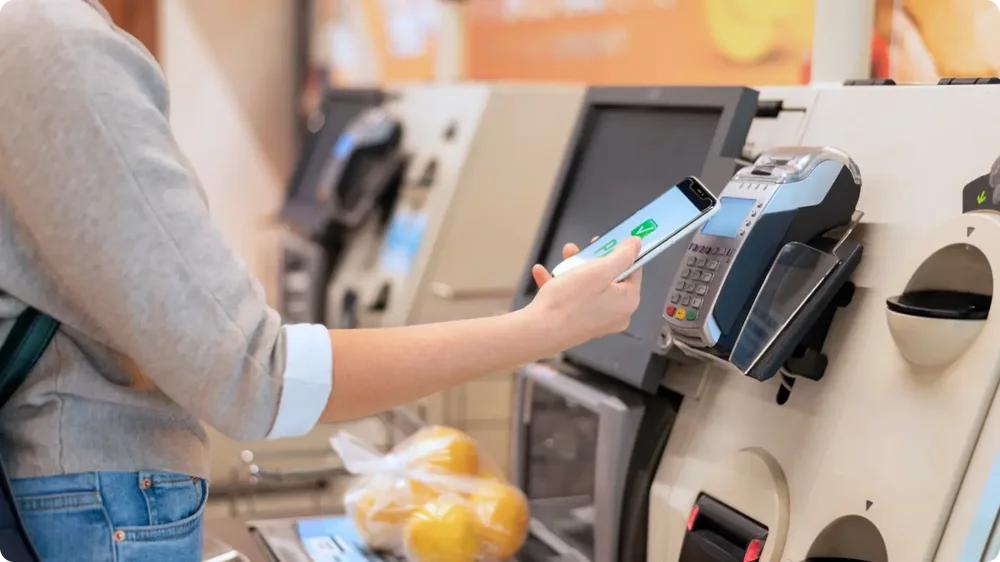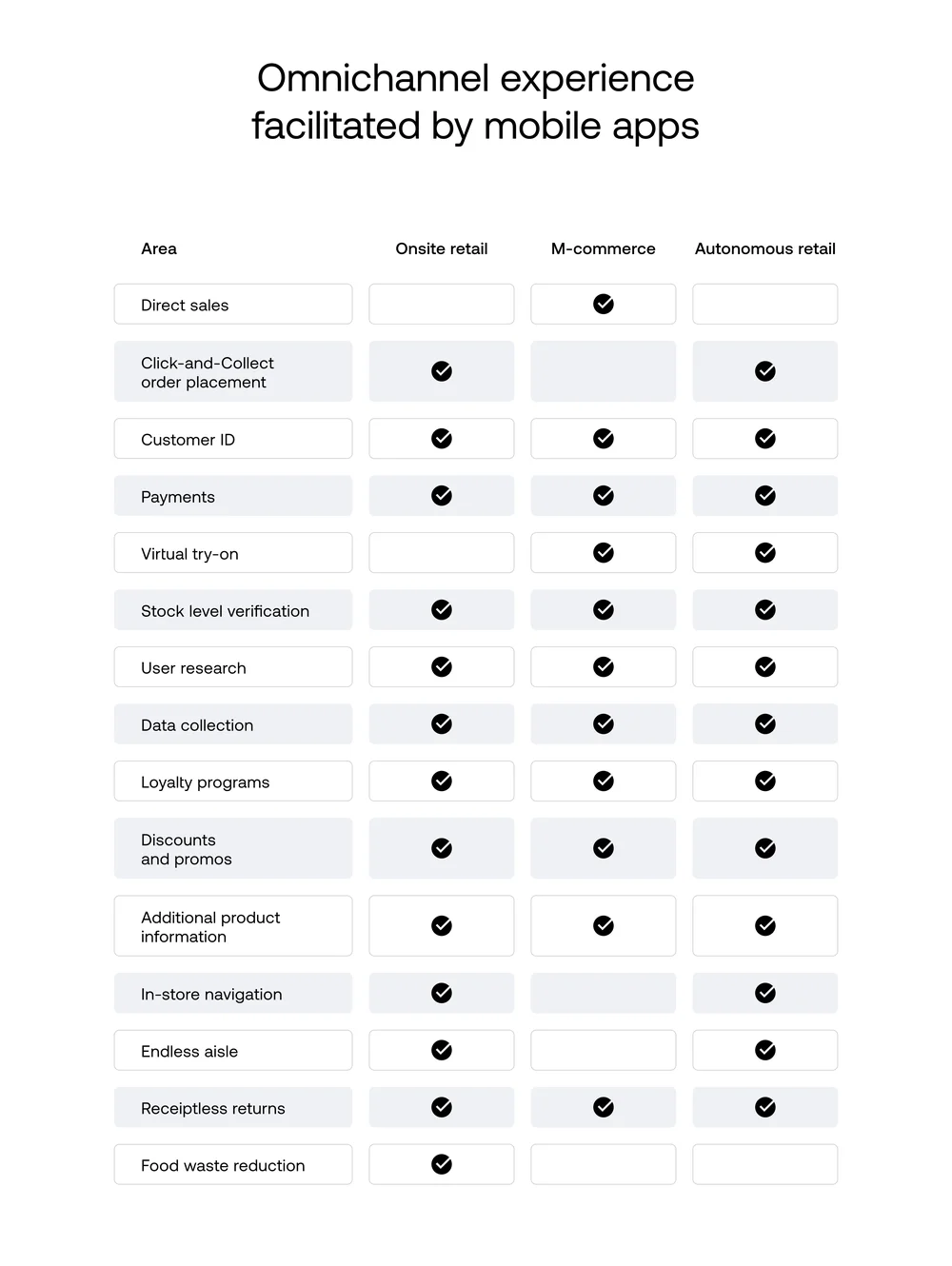
There's no better way to start the year than by attending one of the retail industry's leading conferences. NRF: Retail's Big Show is an annual event attended by some 40,000 professionals from nearly 100 countries. It’s the place to meet not only big players but also startups and providers of cutting-edge technologies of tomorrow. No wonder it takes place in New York City, aptly nicknamed the City of Dreamers.
I had the pleasure of attending the event at the invitation of Future Mind’s strategic partner, Forcom, and their Head of Business Development, Piotr Jurga, an unquestionable authority in POS, Loyalty & Promotion Management, and a classical music enthusiast, who absolutely does not share my love of heavy metal and makes a great interlocutor and a great colleague in scoping integrated digital solutions for large-scale retailers.
The goal of the NRF conference is simple: to let the world know what trends will shape the industry in the coming years. And here is what we got to see.

Retailers have faced a number of challenges in recent years: geopolitical, socioeconomic, and of course those caused by the pandemic. With rising inflation and interest rates and reduced consumer spending, companies quickly saw their inventory levels soar, so the goal for 2024 is to build dynamic supply chains that keep pace with industry growth while improving the customer experience and the pace of sales.
Platforms that collect inventory data will be key to reducing costs and improving profitability. They will enable brands to optimize order, transportation and inventory management so they can sell products at the highest possible margins. We can expect new solutions that allow companies to sell more stock to more customers as quickly and cost efficiently as possible.
Literally every booth at the NRF featured AI-based solutions, and every speech included at least a mention of generative artificial intelligence, which is expected to revolutionize everything we know.
However, the industry is not immune to the risk of oversaturation, as highlighted by the CEO of Saks Fifth Avenue, who jokingly admitted that his team forces him to mention artificial intelligence in every presentation. People used to say that if someone doesn't have a Facebook account, they don't exist. Today, the same goes for companies and professionals who have not added an AI-related keyword to their job title.

What surprised me the most? The amount of hardware. Retailers have already achieved a certain level of automation (e.g., by introducing self-service checkouts), but now they’re trying to combat even more challenges.
Some customers shy away from cashless payments, so at the NRF, we could see a lot of self-checkout solutions supplemented with cash payment capabilities. What’s interesting, such cash registers used to be widely available in the Polish market, for example in Piotr i Paweł stores. However, frequent malfunctions had a negative impact on the customer experience, and brands quickly gave up on this solution. This time around, things may be different, as the new machines presented in New York handled banknotes without any visible issues.
Customer-facing processes are not necessarily where AI shines the brightest. It can also bring huge benefits behind the scenes, streamlining operations and automating repetitive tasks that would otherwise require substantial amounts of time and resources. For instance, categorizing products for e-commerce or marketplace purposes is an impressive example of what Gen AI can do for retailers. AI algorithms can now streamline the arduous task of rebuilding product categories and attributes, helping companies seamlessly transition to new engines or extend their offering with new products. By analyzing existing product descriptions and tapping into vast banks of data, AI can not only categorize items based on provided category trees, but also suggest refined categories and attributes based on newly discovered patterns. This means an even smoother and smarter product lookup experience for end users. And from an organizational perspective, such automation with AI turns processes that could take weeks into a matter of hours. In this particular case, for a company that sells tens of thousands of products, leveraging AI means a significantly faster release of a new sales channel.
As we marvel at new solutions based on artificial intelligence, it’s easy to fall under the impression that before long, including humans in processes will no longer make sense, and machines will replace most specialists. But is that really the case?
Just a year ago, it seemed we were headed toward a world full of self-service checkouts and autonomous stores where we would pay with retinal scans. But now we are noticing exceptions: in some industries, customers want to build relationships with sellers. The role of the cashier may indeed be minimized in the FMCG industry, and technology has the potential to automate many areas, but the human factor will become increasingly significant in areas where the advisor role is gaining importance, e.g., in pharmacies or health & beauty chains.

Consumer markets in developed countries have reached a threshold where product price no longer plays a key role for sizeable demographics. More and more consumers are paying attention to experiences, relationships, brand values, quality of service and convenience. A good example is that of e-grocery. Just a few years ago it was seen as an unnecessary feature offered by only a few players, but soon, its availability and quality may determine a brand’s fate.
The pandemic has completely transformed many consumers’ lifestyles – white collar employees now largely work remotely at least for a few days a week, and when they do, they often don't feel like leaving the house. Ordering groceries to be delivered has become much more convenient, even if the service costs a little more. A few clicks on the app and the products are delivered to our door.
When brands release new solutions, they justify their existence as attempts to meet customer expectations. However, as I observe the market situation, I see myself forced to raise an important question: to what extent are technological trends motivated by a desire to improve the shopper experience, and in what part is their goal to make retail operations faster, cheaper and more convenient? Intuition and experience tell me that in reality, organizations prioritize cost optimization and adapting strategies to ensure more profit, and respect customer opinions or preferences only as far as the pace and volume of sales is concerned.
Some experts foresee an impending end of the popularity of self-checkouts because consumers prefer direct contact with a salesperson. But isn't the real reason for the move away from self-checkouts that brands have realized the frequency of petty theft is causing the losses to start outweighing the profits?
NRF showcased plenty of evidence that retailers are actively looking for solutions to help detect fraud at self-service checkouts. Of course, such fraud is not always intentional, after all, errare humanum est. But how can brands tackle it, no matter where it stems from? For example, by placing a special screen at the checkout scanner, which, if incidental or intentional fraud is detected, will display a message asking the customer if they’re sure they’ve selected the right product.
AI will not only minimize the losses caused by theft at self-service checkouts, but also help optimize the shopping process. Some brands on the Polish market are already trying to use artificial intelligence to improve and facilitate self-service, with varying results. Before long, such AI-based recommendations will become a norm, and they will help shoppers reduce their time at self-service checkout by up to 50%.

In some industries, AI may be a buzzword, but at Forcom, we believe investing in artificial intelligence can bring tangible results for our clients. Our new AI-driven solution for self-checkout drastically reduces the number of fraud incidents and mistakes, which will translate into significant savings for the companies that implement it. In the meanwhile, the support of AI also helps customers scan products much faster, causing the entire process to be much more efficient and seamless. The impact of AI on modern retail is meant to be comprehensive: on top of enhancing security, we are trying to improve customer experience and encourage the use of self-service to relieve the burden on cashiers as much as possible.
By now, everyone’s heard of autonomous stores with no sales representatives needed to run them. But not as many people know that Amazon is the pioneer in this field. And the reason I mention Amazon is that at the NRF, the company presented an innovative concept for a self-service clothing store with no visible theft detection technology and cameras.
All we could see were soft RFID tags on the clothes and a gate where they are scanned. This solution is largely similar to the self-service checkouts we know from, for example, Decathlon. The difference, however, is that the Amazon solution doesn't require customers to put anything in a basket at the checkout. The entire shopping process is limited to three steps: entering the store, selecting products, and leaving. Frictionless? Hell yeah.
Such solutions embody the concept of so-called frictionless shopping, which is meant to be as easy, fast and pleasant as possible. Eliminating the need to interact with the cashier while maintaining an effective control system is a perfect match for the idea of creating a seamless and comfortable shopping environment

Autonomous stores are also another opportunity for retailers to take advantage of mobile apps, a versatile tool that supports multi-channel communication with the modern customer. Apps are not just a standalone component of m-commerce, they’re a tool that offers tremendous value in both online and offline channels, which is especially important because, as our "Młodzi vs Mobile" report shows, 78% of shoppers aged 15-20 use smartphones in brick-and-mortar stores.
Apps are what truly combines traditional commerce, e-commerce, and autonomous shopping into a logical whole. When building innovative digital products, it’s important to consider the technological aspects of how to support and handle all these areas of sales execution within a single system. Making use of all the data you end up gathering means that numerous opportunities for improving customer experience are right at your fingertips: personalized offers, unique discounts, loyalty programs or transaction history that is always easy to access and, for example, allows customers to make returns without physical receipts. These are just some of the mobile app features that you can implement to enhance shoppers’ experiences, increase sales and encourage users to make repeated purchases.
All in all, leveraging modern technology for business results is all about finding synergies between different solutions and approaches to get the largest return possible on your investment. And that’s what we do at Future Mind – feel free to reach out if you’d like to discuss the opportunities brought about by retail innovations in your specific context.